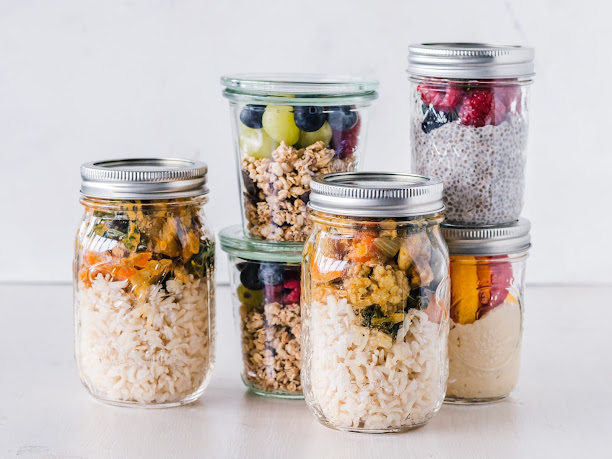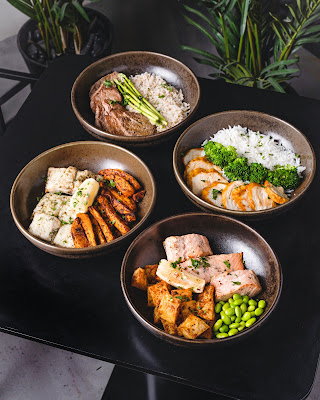Maintaining a healthy diet is essential for overall wellness, but with our busy weekday schedules, it can be a challenge to make nutritious choices consistently. Often, we're rushing out the door without time for breakfast or grabbing fast food for lunch. It's not easy to prioritize healthy eating when time is tight. However, the solution to this problem lies in healthy meal planning. By taking a few hours to prepare your meals in advance, you can save time, reduce stress, and ensure that you're meeting your nutritional needs. In this post, we'll explore the benefits of meal planning, tips for getting started, and some easy meal prep ideas to make healthy eating convenient and achievable, even on the busiest of weekdays.
Benefits of Meal Planning
Meal planning can be a game-changer for those who lead busy lives. It not only saves time, but it also saves money and reduces stress. With a little bit of foresight and organization, meal planning can be a tool to help you eat healthier and make better food choices throughout the week.
One of the main advantages of meal planning is the time it saves. With a plan in place, you won't have to spend precious time figuring out what to make for each meal or running to the grocery store on a whim. By taking a few minutes to plan ahead, you'll also save money on impulsive purchases and reduce food waste by using ingredients efficiently.
Meal planning also ensures that you have healthy, nutritious meals and snacks readily available. It's easy to make poor food choices when you're on the go or feeling rushed. By having a plan in place, you can prepare meals and snacks in advance that are packed with nutrients, helping you stay on track with your health goals.
Overall, meal planning provides numerous benefits for those with busy schedules. Not only does it save time and money, but it also helps you eat healthier and reduce stress. So why not give it a try? With a little bit of effort, meal planning can become a habit that makes a big difference in your life.
Steps to Meal Planning
Meal planning can seem daunting at first, but with a few simple steps, you can make it a breeze. Here's a step-by-step guide to getting you started:
- Set aside some time each week for meal planning. This can be as little as 30 minutes or as much as an hour, depending on your needs and preferences.
- Choose recipes that fit your dietary needs and preferences. You can use recipe apps or cookbooks to find new and exciting recipes, or you can stick to old favorites.
- Make a grocery list based on the recipes you've chosen. Be sure to include all the ingredients you'll need, as well as any staples you may be running low on.
- Shop for groceries either online or at the store. If you're short on time, consider using a grocery delivery service to save time and stress.
- Prep ingredients ahead of time to save time during the week. This can include washing and chopping vegetables, marinating meats, and cooking grains or beans.
- Cook your meals ahead of time if possible, so you can simply reheat them during the week. This is especially helpful for busy weeknights when you don't have much time to cook.
In addition to these steps, there are many tools and resources that can make meal planning easier. Recipe apps like Yummly or Cookpad can help you discover new recipes and organize your grocery list. Cookbooks like "Savor the Moment" by Lucy Michaels offer delicious and healthy meal prep recipes. This guide provides you not only with all the basics for meal prep, it is full of useful tips.
You can also use meal planning templates like those found on Pinterest to help you stay organized.
By following these steps and utilizing helpful tools and resources, meal planning can become a simple and effective way to save time, money, and stress while also eating healthier. Don't forget to use the placeholders to add relevant affiliate product links and make sure the content is engaging and readable for the reader.
Healthy Meal Ideas
Eating healthy doesn't have to be complicated or time-consuming. Here are a few meal ideas that are easy to make and can be prepped ahead of time:
Breakfast:
- Overnight oats: Mix oats, almond milk, chia seeds, and your favorite toppings (such as fruit and nuts) in a jar and let it sit in the fridge overnight. In the morning, you'll have a delicious and nutritious breakfast ready to go.
- Smoothie bowl: Blend frozen fruit, almond milk, and protein powder (optional) in a blender and top with granola, nuts, and fresh fruit.
Lunch:
- Mason jar salad: Layer greens, veggies, protein (such as chicken or tofu), and dressing in a mason jar for a portable and healthy lunch option.
- Quinoa and veggie bowl: Cook quinoa ahead of time and add roasted veggies, chickpeas, and a tahini dressing for a filling and nutritious meal.
Snacks:
- Apple slices with almond butter
- Homemade trail mix: Mix nuts, seeds, and dried fruit in a baggie for a convenient on-the-go snack.
Dinner:
- Sheet pan dinner: Roast chicken or fish with veggies on a sheet pan for an easy and healthy dinner.
- Slow cooker chili: Combine ground turkey, beans, tomatoes, and spices in a slow cooker and let it cook all day for a hearty and nutritious dinner.
Remember, the key to healthy eating on busy weekdays is to plan ahead and be prepared. With a little bit of effort, you can enjoy delicious and nutritious meals without sacrificing convenience or time.
Tips for Staying on Track
Meal planning is only effective if you actually follow through with it. Here are some tips for staying on track:
Set aside time for meal prep: Designate a specific day or time each week for grocery shopping, meal planning, and prepping ingredients. This can save time and reduce stress during busy weekdays.
Cook in batches: Consider cooking larger portions of meals that can be easily reheated throughout the week. This can also save time and reduce the need for daily meal prep.
Freeze leftovers: If you end up with extra portions of a meal, freeze them for later use. This can be especially helpful for busy days when you don't have time to cook.
Have healthy snacks on hand: Stock up on healthy snacks such as fresh fruits, vegetables, nuts, and seeds. This can help prevent unhealthy snacking and keep you fueled throughout the day.
Be flexible: Unexpected events or changes in your schedule can happen, so it's important to have backup options such as pre-made frozen meals or healthy takeout options.
In conclusion, meal planning can be a game-changer for busy weekdays, offering many benefits such as saving time, money, and stress, as well as promoting healthier eating habits. By following the steps we outlined, you can easily incorporate meal planning into your routine, and enjoy simple and nutritious meals throughout the week. Remember to stay on track by prepping ahead, cooking in batches, and being flexible when unexpected events occur.
For further reading and inspiration, check out some of our recommended resources:
The Ultimate Meal-Prep Cookbook
Healthy Recipes and Meal Planning: Tips and Ideas for Delicious and Nutritious Eating
With a little effort and creativity, meal planning can be a fun and rewarding way to improve your health and wellbeing.
Remember, a healthy lifestyle is a journey, and small changes can make a big difference in the long run. Start your meal planning journey today and enjoy the benefits of delicious and nutritious meals that fuel your body and mind.
Disclaimer:
Please note that this post may contain affiliate links. This means that we may earn a commission if you click through and make a purchase. This comes at no additional cost to you. We only recommend products and services that we trust and believe will be valuable to our readers.


Comments
Post a Comment